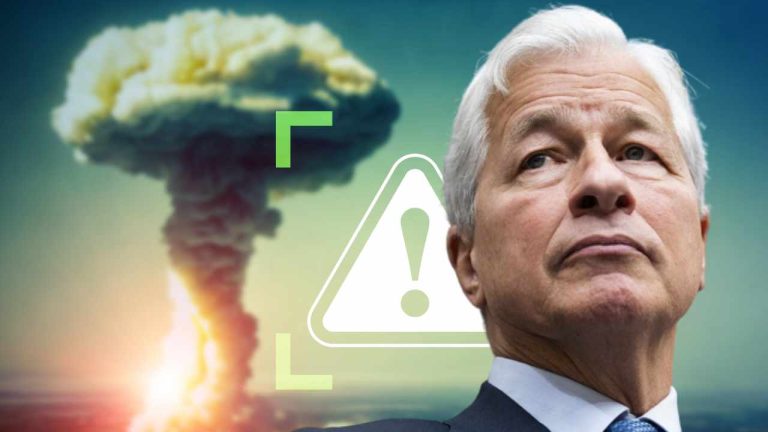JPMorgan CEO Jamie Dimon Sees Nuclear Proliferation as ‘Most Serious Thing Facing Mankind’

JPMorgan Chase CEO Jamie Dimon has identified nuclear proliferation as “the most serious thing facing mankind.” According to the United Nations, “the risk of a nuclear weapon being used is currently higher than at any time since the depths of the Cold War.” Dimon also pointed out that “central banks 18 months ago were 100% dead wrong.”
Jamie Dimon Discusses Greatest Threats to Global Economy
The chairman and CEO of JPMorgan Chase, Jamie Dimon, discussed the greatest threats to the global economy and the state of the U.S. economy on Tuesday during a panel discussion at the Future Investment Initiative (FII) summit in Riyadh, Saudi Arabia. He underscored the seriousness of the proliferation of nuclear weapons, ranking it above climate change and other commonly cited threats.
The panel also featured H.E. Yasir Al-Rumayyan, the governor of Saudi Arabia’s Public Investment Fund and chairman of Aramco’s board of directors; Bridgewater Associates founder Ray Dalio; Blackrock CEO Larry Fink; Citigroup CEO Jane Fraser; African Rainbow Minerals founder Patrice Motsepe; HSBC CEO Noel Quinn; Carlyle Group co-founder David Rubenstein; Blackstone Group CEO Stephen Schwarzman; Sequoia China’s managing partner Neil Shen; Goldman Sachs CEO David Solomon; and Macquarie Group CEO Shemara Wikramanayake.
Dimon was asked whether he is optimistic about the economy going forward and whether he shares the widespread obsession in the financial world regarding potential Federal Reserve interest rate hikes or cuts, as well as the impact of Fed decisions on the economy. While claiming that he is “generally an optimist,” the JPMorgan boss stressed: “You’d be foolish not to look at some of these things taking place today in Ukraine, Middle East … It’s affecting oil, food prices, gas prices, migration, potential starvation. It’s probably the most serious thing we’ve faced.” The JPMorgan executive added, “I hear people talking about ESG [Environmental, social, and corporate governance] all the time,” emphasizing:
The most serious thing facing mankind is nuclear proliferation. If we’re not sitting here 100 years from now, it will be nuclear proliferation. It’s not our climate.
Dimon explained that the current geopolitical situation is more complex than it has ever been. Moreover, he said: “I look at the financial situation, the fiscal spending, which is more than is ever. I’m talking about the United States but almost true around the world. It’s more than it’s ever been in peacetime by a long shot with the highest debt levels we ever had by government and there’s just kind of omnipotent feeling that central banks and government can manage through all this stuff. I’m cautious.”
The United Nations wrote in a statement in March: “The risk of a nuclear weapon being used is currently higher than at any time since the depths of the Cold War.” The UN added that the Russia-Ukraine war represents “the most acute example of that risk,” noting that “the absence of dialogue and the erosion of the disarmament and arms control architecture, combined with dangerous rhetoric and veiled threats, are key drivers of this potentially existential risk.”
The JPMorgan chief continued: “I don’t think it makes a piece of difference whether the rate goes up 25 basis points or more … Whether the whole curve goes up 100 basis points, I would be prepared for it. I don’t know if it’s going to happen.”
Furthermore, he said:
When you look at economics … I want to point out that central banks 18 months ago were 100% dead wrong … I would be quite cautious about what might happen next.
Earlier this month, Dimon said the war in Ukraine, compounded by the attacks on Israel, “may have far-reaching impacts on energy and food markets, global trade, and geopolitical relationships.” He emphasized at the time: “This may be the most dangerous time the world has seen in decades.” He also foresees two “extraordinary” storm clouds hitting the U.S. economy with potential bad outcomes. Last month, he cautioned that the Fed could raise interest rates to 7% and the U.S. economy could experience stagflation.
What do you think about the statements by JPMorgan Chase CEO Jamie Dimon about nuclear proliferation and the U.S. economy? Let us know in the comments section below.

